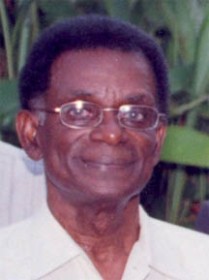The “political moment” is moving in the favour of fundamental change, according to WPA Co-leader Professor Clive Thomas, who says opposition forces have to put themselves in a position to shift the power structure away from the PPP/C’s exclusive domain.

“There is a growing rise in the consciousness of several sections of the people, including even supporters of the PPP/C, that you cannot continue to rule in the old way,” he said last Wednesday at a WPA-organised “Groundings” discussion. “It cannot be business as usual. And there is therefore an imperative there driving for change.”
Thomas suggested that with the emergence of such a political moment, there is the possibility of an emergence of “an exogenous event” that can become the “catalysing force” for advancing the process. In this regard, he said opposition forces have to position themselves to seize on the moment to drive the process forward.
Thomas said that a coalition or political partnership is the only credible option to change the current power structure. As a result, he voiced criticism of the AFC’s decision to scuttle the possibility of a united opposition slate by rejecting any prospective partnership with the main opposition PNCR. He noted that the party opted out before a process to formalise a partnership was even initiated.
Speaking about successful political alliances elsewhere, he noted that unity is a factor that favours them. “I would put it to you that in Guyana there is no other credible means of changing the power structure apart from the unity of the forces against the existing structure of power. Even that cannot be assured success. Far from it but it’s the only credible option that exists…The only credible alternative that we are faced with is moving forward by way of a partnership or an electoral alliance of some sort,” he said.
Thomas further discredited attempts to form a fractional unity “against fractions within the political spectrum” other than “the main broad spectrum of political forces.” He said such a venture would never have any credibility in the way of shifting the political structure. “So, the unity that is needed is a necessary unity because fractional unity, under no permutation, can possibly arrive at that,” he explained. As a result, he suggested that the AFC defection from the process of an opposition alliance is a capitulation in the struggle to change the country’s power structure which he described as the primary objective at this point.
Meanwhile, Thomas highlighted several features essential to a coalition or partnership arrangement. He noted the importance of “strong,” “powerful” and “quality” leadership to take the process forward. Also, he said “trust and integrity” are needed to ensure that the participating groups are willing to commit to the process meaningfully, rather than as a result of opportunism. “The way in which the process unfolds is very important. You have to build a commitment to what you are doing. You have to ensure that when you make an agreement, it is being honoured both in terms of the letter and the spirit of the agreement,” he noted.
Thomas said too that before a process is initiated a mediation mechanism would be needed to arbitrate any conflicts that may arise.
In order for an arrangement to move forward, Thomas also said there have to be agreed objectives, an agreed electoral platform, an agreed method for advocacy and electoral campaigning as well as an agreed vision. “In Guyana, what we want is an open, democratic, inclusive, multi-party government as a permanent feature of our politics. And to move to that position, you have to begin to make the effort, by embodying your vision,” he said.





